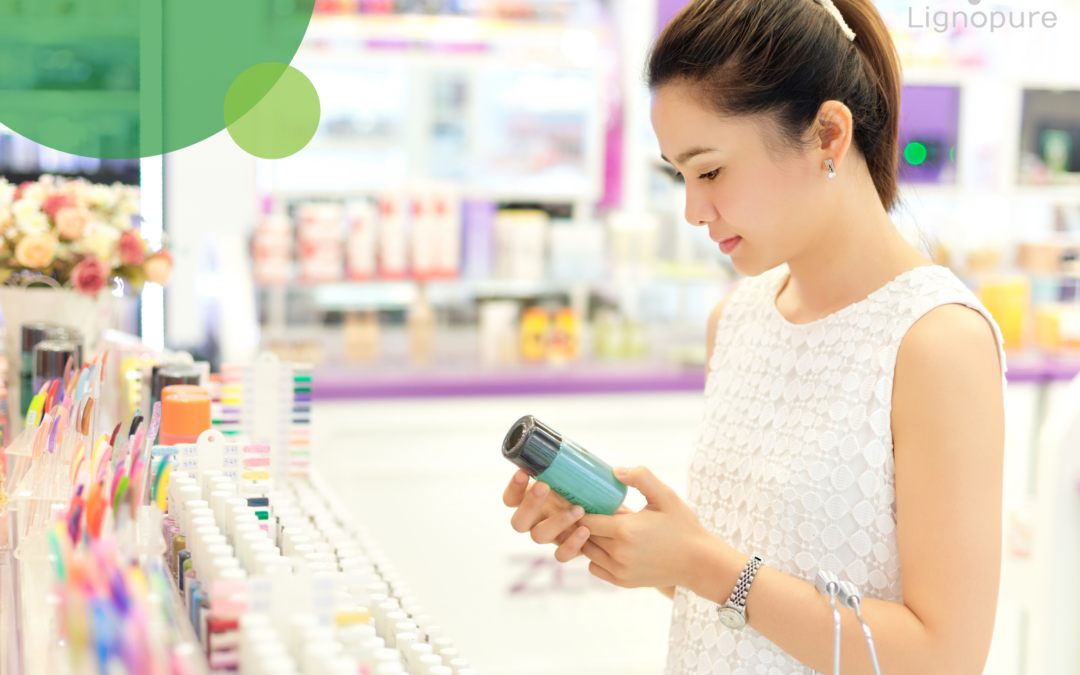
Written by: Gabriela Meza Armenta – Marketing and Business Development Manager at Lignopure
Microplastics are tiny plastic particles, that can be found in a variety of products, including sunscreens, shower and skincare products. The use of these products has come under scrutiny in recent years due to concerns about their impact on human health. In addition to these dangers, microplastics also contribute to the global plastic pollution problem, which has a range of negative environmental impacts.
Environmental and human health dangers
Microplastics can enter waterways and oceans, where they can harm marine life. Fish and other sea creatures can ingest the particles, which can lead to physical damage or blockages in their digestive systems. There, these materials can also accumulate in the food chain, potentially causing harm to humans who consume seafood.
In humans, microplastics come in the form of microbeads and film formers, which depending on the formulation, can serve as emollients, texture enhancers and UV filters. These materials can be absorbed through the skin, potentially causing irritation or other health effects. Also, there are concerns that microplastics could act as carriers for other harmful chemicals, such as pollutants and heavy metals, which could be absorbed by the body. Some products that may contain microplastics include sunscreens, exfoliating scrubs, makeup, mascaras, lip products, anti-aging creams, among others.
Together against the use of microplastics
To address this issue, many countries have implemented bans or restrictions on the use of microplastics in sunscreens. Hawaii, for example, has banned the sale of sunscreens containing oxybenzone and octinoxate, two UV filters that are believed to contribute to coral bleaching and harm marine ecosystems. The European Union has also banned the use of microplastics in rinse-off personal care products, including sunscreens.
Likewise, many countries have banned or restricted the use of microbeads in personal care products. In the United States, for example, a federal ban on microbeads in rinse-off cosmetics went into effect in 2017.
Small steps toward a microplastic-free cosmetic industry
Overall, it is important to be aware of the impact that our personal care choices can have on the environment and to make informed decisions when selecting skincare products. If you are concerned about microplastics in your personal care products, there are a few things you can do.
First, read the ingredient list on your products carefully and look for any mention of microbeads or microplastics and look that all your personal care products are labeled as “microbead-free”, “plastic-free” or “zero plastic inside”.
Also, choose sunscreens that are labeled as “reef-friendly” or “ocean-friendly.” These sunscreens are formulated without harmful chemicals and microplastics that can harm marine life. Look for products that use mineral sunscreens, such as zinc oxide or titanium dioxide, as these are considered safer for the environment, as well as LignoBase, our natural multifunctional ingredient that boosts the SPF factor without harming the environment or the life below water.
Finally, it is worth noting that the exact risks associated with microplastics are still being studied, and more research is needed to fully understand their impact on the environment and human health. However, given the potential dangers, many organizations and governments are taking steps to limit the use of microplastics in consumer products and everyone has the power to choose products free of these harmful ingredients.

